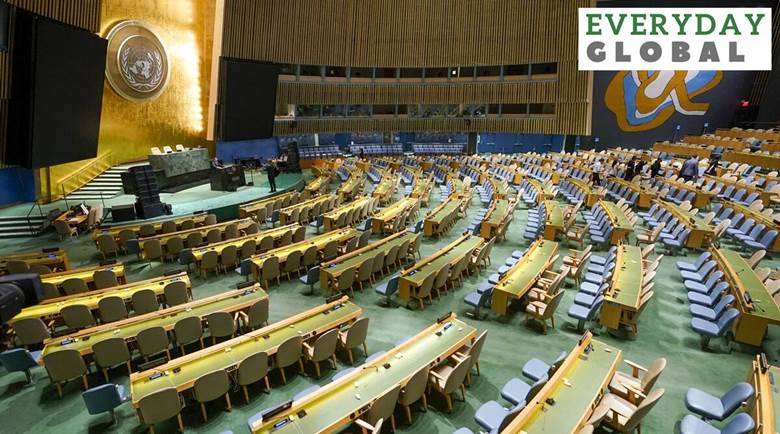Description

Copyright infringement not intended
Context:
- After two years of in-person restrictions due to the Covid-19 pandemic, leaders from across the world convened in New York for the 77th session of the UN General Assembly (UNGA) with September 20 being the first day of the high-level General Debate.
What is the UNGA?
- The UN General Assembly (UNGA), the United Nation’s chief policy-making and representative organ, was created in 1945.
- It meets from September to December every year, and then again between January and August.
- At the beginning of each regular session in September, the Assembly holds its main event — the general debate, where representatives of each member state are provided the opportunity to raise any issues that concern them.
- It is one of the six principal organs of the United Nations(UN).
- It serves as the main deliberative, policymaking, and representative organ of the UN
- Its powers, composition, functions, and procedures are set out in Chapter IV of the United Nations Charter.
- The UNGA is responsible for the UN budget, appointing the non-permanent members to the Security Council, appointing the Secretary-General of the United Nations, receiving reports from other parts of the UN system, and making recommendations through resolutions
- It also establishes numerous subsidiary organs to advance or assist in its broad mandate.
- The UNGA is the only UN organ wherein all member states have equal representation.
- It can reconvene for special and emergency special sessions.
- Voting in the General Assembly on certain important questions—namely recommendations on peace and security; budgetary concerns; and the election, admission, suspension or expulsion of members—is by a two-thirds majority of those present and voting.Other questions are decided by a simple majority. Each member country has one vote.
- Apart from the approval of budgetary matters, including the adoption of a scale of assessment, Assembly resolutions are not binding on the members.
- All 193 members of the United Nations are members of the General Assembly, with the addition of Holy See and Palestine as observer states.
What are the issues that are likely to be raised at UNGA?
- The theme for the 77th session is “A watershed moment: transformative solutions to interlocking challenges,” which emerges from the recognition that the world is at a critical moment due to “complex and interconnected crises,” the UN states.
- “The General Assembly is meeting at a time of great peril,” UN Secretary-General António Guterres said last week.
- “Our world is blighted by war, battered by climate chaos, scarred by hate, and shamed by poverty, hunger, and inequality.”
- The Assembly meetings are also taking place after a heightened climate crisis has led to deadly floods in Pakistan, leaving thousands dead and millions more displaced, while severe droughts affect parts of Europe and China.
- Seven months into Russia’s invasion of Ukraine, the war between the two countries will likely dominate discussions at the event. Guterres had said geopolitical divisions were the “widest they have been since the Cold War.”
- Both Russia and Ukraine are significant exporters of grains and fertilisers, and the UN has said that the war has exacerbated the food shortage crisis caused by pandemic and climate change.
- India was among the 101 countries that voted on September 17, in favour of allowing Ukrainian President Volodymyr Zelenskyy, who hasn’t left his country since the outbreak of the war, to address delegates at the General Debate via a pre-recorded speech.
- It remains unlikely that Iran’s 2015 nuclear deal will come up on the sidelines of the 77th session.
What is the order of the speakers and how is it decided?
- The General Assembly date is divided into two segments each day — a morning session and an afternoon session. Everything from the order of speakers, to the length of their speeches, is laid down in a complex set of conventions and bylaws.
- The General Debate is first called to order by the President of the General Assembly, which this year is Hungarian diplomat Csaba Korös. Subsequently, UN Secretary-General Antonio Guterres will introduce the annual “Report of the Secretary-General on the work of the Organisation.” The debate is then opened after the president makes a speech.
- Brazil has been the first Member State to speak in the annual general debate for nearly seven decades, ever since the 10th UNGA in 1955. The tradition dates back to the early years of the UN, when most countries were reluctant to be the first to address the delegation. At the time, Brazil was the country that volunteered to speak first.
- The US, as the host country, is the second member state to speak.
- After the first two speeches, the speaking order is not fixed and is based on factors such as level of representation, the rank of the representatives, preference and geographical balance.

What are the issues India will be focusing on at UNGA?
- Prime Minister Modi is not attending this year’s UN General Assembly Session.
- Instead, External Affairs Minister S Jaishankar, who arrived in New York on Sunday (September 18), will be the country’s official representative at the event.
- The key issues that India will be focusing on during the high-level UN General Assembly session are counter-terrorism, peacekeeping, reformed multilaterism, climate action and equitable access to COVID-19 vaccines.
- The five S’s: Samman (Respect), Samvad (Dialogue), Sahyog (Cooperation), Shanti (Peace) and Samriddhi (Prosperity), laid out by PM Narendra Modi will be the “guiding light” in India’s approach to the UNGA.
- He will also be hosting a Ministerial meeting of the G4 nations — India, Japan, Germany and Brazil, according to the Ministry of External Affairs.
- Additionally, Jaishanker will take part in the High Level Meeting of the L.69 group, a major bloc of developing countries from Africa, Latin America, the Caribbean, Asia and the Pacific, that are focused on reforms of the UN Security Council.
https://indianexpress.com/article/explained/everyday-explainers/united-nations-general-assembly-all-you-need-to-know-8161647/












